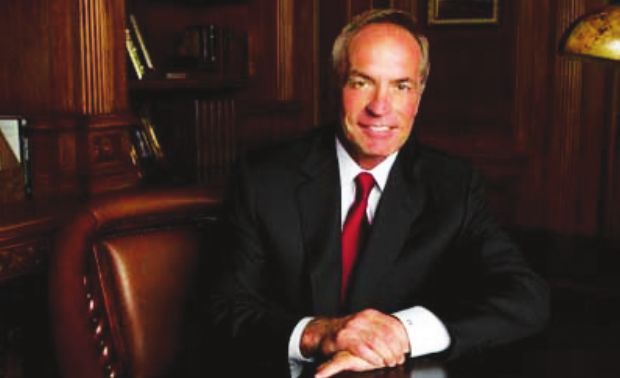
Outlook bleak for coal company
Recent weeks haven’t been easy on Foresight Energy.
The St. Louis-based coal company founded by Chris Cline, the mining baron who moved from Appalachia to Illinois a decade ago on the theory that Midwest coal would be a path to even greater prosperity, has seen its stock tumble from $8.73 in mid-October to $2.65 this week, ending a brief autumn rally that had been a respite from an industry-wide slump. The stock debuted at $19.57 when Foresight went public in June 2014, just as the market for coal was on the brink of collapse. The company’s fortunes sank even further this month when a Delaware judge said that $600 million in bondholder debt could be due immediately.
Beyond money is a human cost, as Tyler Rath, 20, died Dec. 8 in an apparent accident at Foresight’s Sugar Camp mine in Macedonia. The federal Mining Safety and Health Administration says that Rath was driving a tractor that was run over by the trailer he was pulling. Franklin County Coroner Marty Leffler has established blunt force trauma to the head, neck, trunk and extremities as a preliminary cause of death. Rath left behind a wife, a month-old son and a two-year-old daughter.
“He loved his job,” Alisha Rath, the widow, told WSPD-TV, which is based in Paducah, Kentucky. “I hated it.”
Seven coal miners have died in Illinois since 2013, and Rath’s death was the third at Sugar Camp. In 2013 a Sugar Camp miner was killed by a one-ton slab of coal that fell, pinning him against mining equipment. The death happened just 17 days after another miner was injured by falling coal, and the MSHA found that the mine operator had “engaged in aggravated conduct constituting more than ordinary negligence” by allowing miners to work without adequate precautions. In 2014, another Sugar Camp miner was fatally crushed between a piece of equipment and a mine wall. The MSHA concluded that training was substandard and that the equipment wasn’t properly operated.
Sugar Camp, which can produce 13.5 million tons of coal each year, is the thirdmost productive coal mine in the nation as measured by tons produced for every hour worked, according to Foresight, which boasts that it also owns the most productive mine, Deer Run in Hillsboro. But Deer Run has been shut down at least four times since Foresight went public 18 months ago, most recently on Dec. 2, due to fire. Since fire (or “combustion event” in the nomenclature of whomever writes Foresight’s press releases) was first detected in July 2014, the mine has been closed for more than seven months while the company has injected foam, nitrogen and water into the mine, with fire ultimately returning.
Underground coal fires can be difficult to extinguish – a Pennsylvania mine that ignited in 1962 is still burning. After previous closures of the Deer Run mine due to fire, Foresight told investors that it expected to fulfill sales contracts despite the mine being idle. The most recent closure this month prompted a more somber message.
“If mine personnel are unable to reenter the mine for a prolonged period, the Partnership’s ability to satisfy sales commitments could be negatively impacted,” Foresight said in a news release.
Gary M. Broadbent, assistant general counsel and media director for Foresight, declined to say anything beyond what is contained in company press releases.
“We have to be very careful about what we say publicly,” Broadbent said. “Securities laws are very strict.”
Two days after fire closed Deer Run, Foresight on Dec. 4 was hit by a Delaware judge who said that Foresight bondholders who hold $600 million in debt are due their money immediately, thanks to a deal last spring in which Murray Energy Corp. acquired a stake in Foresight. Murray originally agreed to pay $1.39 billion for an 80 percent share of Foresight, but the deal was rejiggered so that Murray paid $1.37 billion for a 34 percent share, plus an option to pay just $25 million for an additional 46 percent share in Foresight in the future.
Under terms of Foresight’s bond debt, any change in control of the company requires the company to cash out bondholders, who otherwise aren’t due to be paid until 2021. A trustee for bondholders in the Delaware case argued that the deal between Murray and Foresight amounted to a change in control, and J. Travis Laster, vice chancellor of the Delaware Chancery Court, agreed. The judge noted that Foresight had lowered the original purchase price by less than 2 percent while maintaining that Murray was not, in fact, gaining control, despite the option to gain an 80 percent share.
“That is preposterous,” Laster wrote in his ruling. “In fact, Murray Energy received de facto control in the revised deal, which is why it paid virtually the same amount as in the original deal.”
Six days after Laster’s ruling, Foresight announced that it had received a default notice from bondholders. Assuming bondholders don’t demand immediate payment and lenders don’t yank credit that funds ongoing operations, Foresight says that it will be able to meet its financial obligations. But there are no guarantees. In a Dec. 7 press release, the company notes that it could be required to post a bond if it appeals Laster’s decision in court. Bottom line, Foresight’s future may depend on bankers.
“(I)f our revolving credit facility lenders are unwilling to lend us sufficient cash to fund our cash operating costs, we may be unable to fund our existing operations,” the company said.
Contact Bruce Rushton at [email protected].